Fiji/Tuvalu 2018 Report
June 20 – July 3, 2018
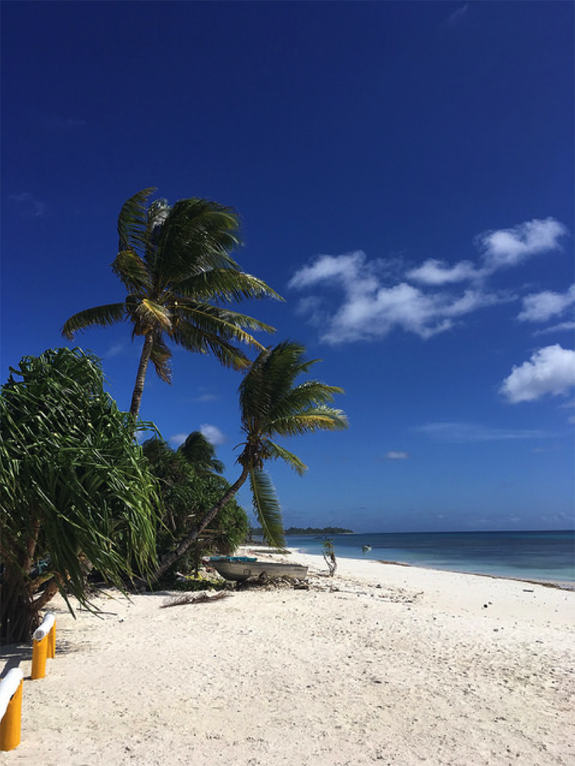
As I made my way to Tuvalu, I decided to spend a few days in Suva, Fiji. My plan was to visit a few colleagues and get caught-up-to-speed on archival projects and updates at various organizations throughout the capital. Arriving on a late Friday afternoon, however, forced me to move my meetings to the following Monday when my colleagues could give my their full attention. There was no sense of interrupting that beloved "it's the weekend" feeling. So I entertained myself for the weekend, and as luck would have it, 4th Annual National Women's Expo was taking place at the National Gymnasium for a couple of days. This event allowed women from all over the Fijian islands to showcase and sell their products. The Minister for Women, Children and Poverty Alleviation, Mereseini Vuniwaqa said it was an area to empower Fijian women as entrepreneurs and enhance their economic participation. There were approximately 340 women who participated in this colorful event and thousands came to shop, hear guest speakers, and watch entertainment. Outside the gymnasium booths were set up to sell food, plants and more arts and crafts. Overall, it was the perfect cultural event to attend especially on such on rainy weekend.
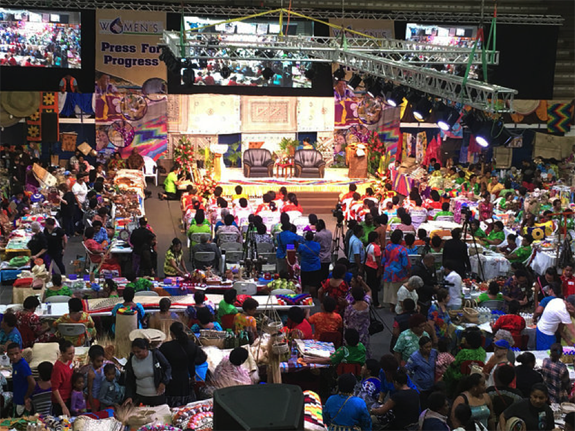
I only had Monday to meet with colleagues before catching a flight to Funafuti, Tuvalu. My first meeting was with Opeta Alefaio, National Archivist at the National Archives of Fiji. Opeta gave me an updated on the latest news regarding the archives. We then discussed ways that Island Culture Archival Support can help the organization. One of the most important projects that we agreed on was to conduct a three-day Disaster Preparedness workshop hosted at the National Archives. We came up with a long list of those to invite that included records professionals from nearby island countries. After this, I made my way to Sacred Heart Catholic Church where I met with Katherine Foi of the Marist Champagnat Institute in Vatuwaqa. The two of us then visited with Marina Konrote who was the Chancellor of the Roman Catholic Archdiocese and who is currently in charge of the Diocese archives. Allowed us to visit the archives, which was situated next to her office. The archives seemed to be in good shape, but like many archives around the world, it was out of space to add new collections. I did not get the impression that newer collections were being processed, and older collections definitely needed some preservation work. Needless to say, we plan to put together a processing/preservation project in the near future. It is an overwhelming archives and I believe was very appreciative with the forthcoming help.
Following our visit at the Diocese Archives Katherine and I grabbed a taxi and headed to the Oceania Marist Province. Katherine introduced me to the new archives caretaker, Selai Nabola who recently took over from Father Roger. We discussed many topics including the Pacific Regional International Council on Archives (PARBICA) membership, the Marists Archives, and the Marist's Photograph Collection project, which I started two years ago and have not had time to finish. Katherine and enthusiasm for the archives, I believe, will ensure the safekeeping of its unique and valuable records for years to come. With a little training they will also be able to build on the good work that Father Roger started a few years ago. After this, Katherine dropped me off at the University of South Pacific (USP) where I met with Jason Flello and his staff head of the Records Management Department for the university. The staff took me to a late lunch at a nearby Indian restaurant and made me feel like a distinguished guest. Later in the afternoon I had the honor of sitting in a meeting with Jason and the architects in charge of building the new USP Archives building. Indeed, this is very exciting times at the university who are not only in the middle of the celebrating their 50th anniversary, but they are in the process of creating a new archives building where they can house the many unique records of its diverse departments and community.
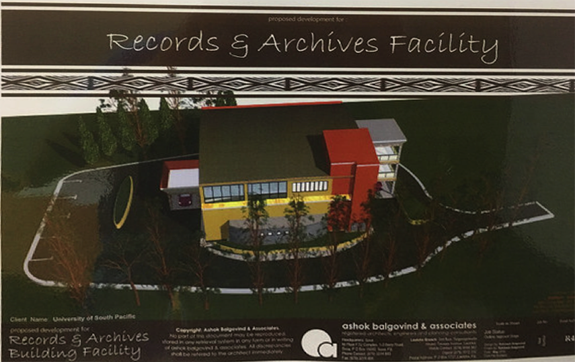
The following morning I arrived in Funfuti, Tuvalu, to quite the fanfare. Little did I know that the plane I was in was full of Polynesian dignitaries who were going to the little island country to attend the 8th Polynesian Leaders Group Summit. The theme for this summit was Climate Change. It seemed as if the whole island came out to welcome the leaders to Tuvalu. There was music, dancing and speeches. The Ministry of Education was tasked of creating a man-made island at the airport symbolizing that all Polynesians are connected. It was quite extraordinary- an island within an island. For the next three days the leaders would meet at various spots across the island. The people of Tuvalu truly worked hard to make the visitors feel as if they were part of something quite eventful. Every so often I stumbled across entertainment that was geared towards the dignitaries and got to enjoy the festivities as well.
Nevertheless, I had my own agenda and reason for coming to Tuvalu. A year ago I had started a project at the National Archives and Library to process the backlog of collections that were being stored in a twenty-foot container. The collections are predominantly composed of paper records from Government Ministries. Our daily tasks included cleaning the documents and removing metal fasteners, re-folder documents in acid-free folders and create box lists with the ultimate goal of producing finding guides for the collections. There was also some appraisal work taking place before the processing of records, which allowed us to discard certain types of records that was not identified in the archive's collection policy. This helped lighten our workload. The most important part of the project, however, was the training of archives and library staff in the archival practices of appraising, preserving and processing of records. This would ensure sustainability in a very fragile environment.
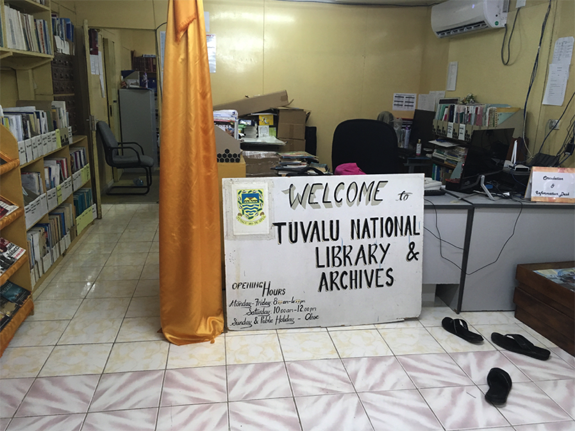
Although the project got off to a great start in 2017, some changes came to the Tuvalu National Archives and Library. A staff member retired, and a new archivist assistant was hired. The new archivist assistant, Fakalei Makaga, was a much needed addition to the archives and a terrific support to the two librarians, Mamao Tafao and Fagaatia Nikotemo, who have been working on the project. Unfortunately, a few months into the project, Chief Archivist Noa Tapumanaia, had no choice but to push aside the project for an indefinite amount of time when a more immediate assignment unexpectedly occurred. In this instance the organization received a chance to digitize important historical records. The archives/library were given to digitization workstations and staff had to learn how to use it and then commit to digitizing the records. Although this took time away from the processing project, the acquisition of digitization equipment will have a significant impact on the preservation and access of records in the near future.
I arrived in Tuvalu on Tuesday, June 26, and had planned to work at the National Archives and Library for a week. The goal for this trip was to revitalize the project and train the new staff member, Ms Makaga. Several months prior to my visit I had continued to ship supplies which consisted of mostly archival record center boxes, and brought some smaller supplies with me in my luggage. Once we put our supplies together, we tried to determine the best spot to execute the project. Processing records takes a lot of space and so we decided to use a table in the library that provided ample space to fit all five of us. The next step was to choose which collection to process and decided on a backlog that was recently deposited to the library. These were records from the Ministry of Foreign Affairs. Although many boxes were being stored in the library, we found at least 22 boxes that belonged to the Ministry of Foreign Affairs. Thus, we believed that once we processed this collection it would free up much needed space in the library.
The continuation of the project this year started very well and we instantly got into a good working rhythm. The staff was dedicated to the project and was eager to get it started again. Fagaatia, Fakalei, Mamao and myself worked on preserving and processing the records just like we have been doing over the past year. Noa created box lists after we had finished with the processing. Appraisal decisions over certain folders would rarely arise, but when they did, Noa would make the final decision. We kept the arrangement simple. Each box from the Ministry of Foreign Affairs was numbered starting with box 1, and so we processed them in numerical order. With the box lists, records can now be found quicker and easier. A copy of the box list went inside the actual while another copy was stored on the computer. Eventually, these box lists will be used to create a Finding Guide.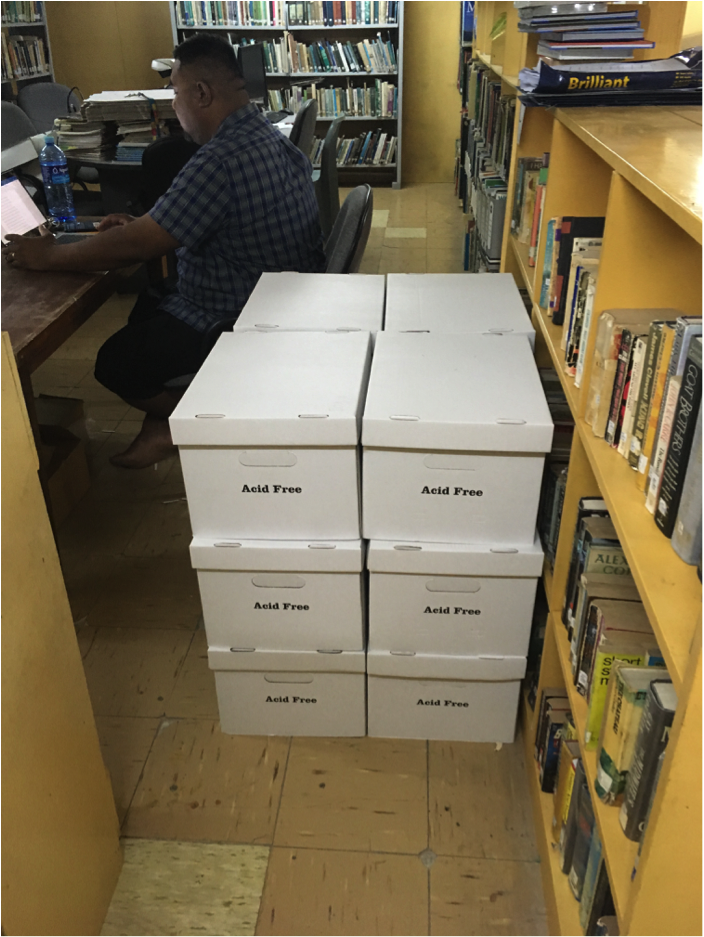
Overall, it is a pleasure to report that the processing project is now back on track and the new goal for the Tuvalu National Library and Archives is to clear the backlog by the end of the year especially those boxes that have been deposited inside the library. During my week with the staff we managed to process fourteen boxes. We also identified a volunteer who shows a genuine passion and aptitude towards working with library and archival material. Be that as it man the timing of the project could not be better because the Ministry of Education (which the Library/Archives falls under) has recently approved the construction of a new National Library and Archives building to be built on the island near the University of South Pacific- Tuvalu campus. Architectural designs for a two-story building are in development and research is being conducted on how other Pacific Islands archive buildings that have recently been built. One of the biggest issues facing the island is the adverse affect that climate change poses on the people. The new library and archives building will not be immune to these changes. However with the right research and collaboration, like the processing project has generated, the future of the library and archives will be able to combat against threats caused by climate change.
